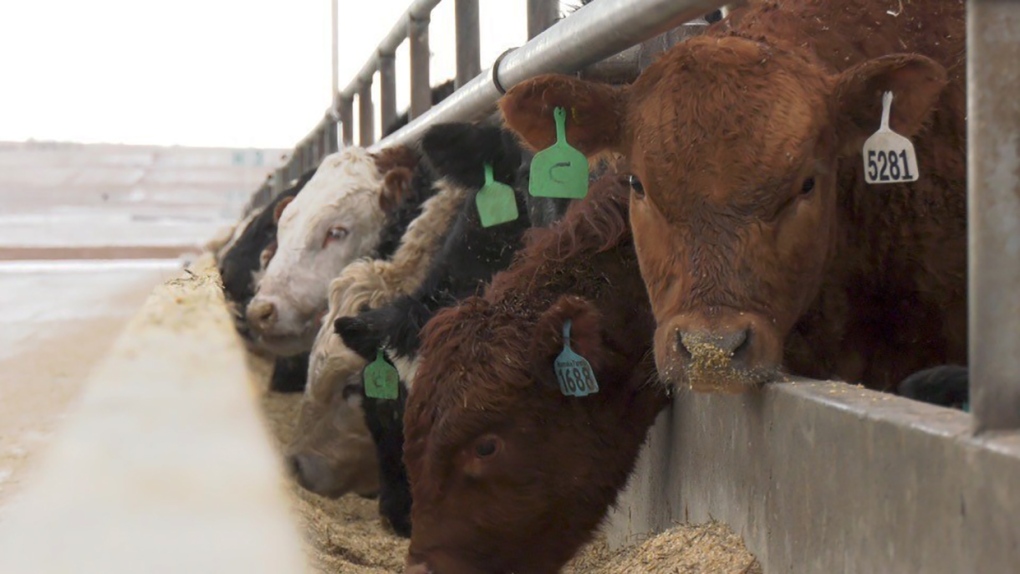Alberta feedlot operators running low on grain for cattle
 Some of the cattle at Namaka Farm operated by Stuart Thiessen who says delayed shipments of feed from the US are impacting his business
Some of the cattle at Namaka Farm operated by Stuart Thiessen who says delayed shipments of feed from the US are impacting his business
The drought farmers experienced in 2021 is impacting feedlot operators in the province. Crops last summer didn't yield much grain that cattle producers need to feed their animals. Now they're relying on corn and dried distillers' grains from the U.S., but COVID-19 has thrown a wrench into the supply chain.
"There's been delays in shipments on the rail side, we're short of labor, we're short of truck drivers, it's just kind of been the perfect storm," said Janice Tranberg, president and CEO of the Alberta Cattle Feeders Association.
Tranberg says feedlot operators all over the province are impacted by delays in shipping. Typically cattle feed is a combination of silage and barley to help animals bulk up before processing. But now operators are mixing corn with the barley and will switch to all corn when the barley runs out. And they're relying on those corn shipments that are delayed.
"And honestly, there's been a few feedlots that have contacted me that they are right at the very bottom of the bin," said Tranberg. "So it's now becoming a pretty big issue."
SKYROCKETING DEMAND
Tranberg says in 2020, 600 railcars of corn were shipped from the U.S. As of mid-December 2021 that number had skyrocketed to 8,000 and the need continues to increase early in 2022.
"We have weekly calls with our rail colleagues and with our grain companies helping them to understand what the need is," she said.
Canadian Pacific Railway said in a statement, "Customer demand to ship corn and dried distiller's grains for cattle feedlots increased significantly in 2021. That increased demand has continued into 2022."
It continues, "CP is committed to servicing our customers and playing a role in enabling feed to be supplied to feedlots during this challenging crop year."
Stuart Thiessen runs Namaka Farms southeast of Strathmore. He has 21,000 head of cattle and he has about two weeks of feed left in his bins to feed them. He's frustrated by the delay in shipping.
"I'm definitely hearing that the trains are sitting in the US or not getting here, sitting in South Dakota and not getting here," said Thiessen. "We're hearing that trains are sitting for 10 days before they're getting picked up by our local guys that bring it in."
Thiessen says he's hearing some other feedlot operators are running low on feed. He has a contingency plan to switch his cattle to a maintenance diet rather than a bulk diet if his supply gets too low.
"If grain quit coming from the US, honestly, (the cattle would) ultimately starve," he said. "I wish I could tell you a nicer (outcome), we don't even have the capacity to harvest them quickly right, like they would all honestly starve, that's where it would end."
Thiessen says there are five generations of his family that have run the farm and he's never seen a feed shortage like this.
Tranberg continues to work with the railway and government to come up with a solution to increasing shipments of feed from the US.
"This is animal welfare," said Tranberg. "This is feeding animals right, so I think making that connection on how much of a priority it is has helped."
But Thiessen has no idea when his next shipment will arrive.
CTVNews.ca Top Stories

American millionaire Jonathan Lehrer denied bail after being charged with killing Canadian couple
American millionaire Jonathan Lehrer, one of two men charged in the killings of a Canadian couple in Dominica, has been denied bail.
LeBlanc says he plans to run in next election, under Trudeau's leadership
Cabinet minister Dominic LeBlanc says he plans to run in the next election as a candidate under Prime Minister Justin Trudeau's leadership, amid questions about his rumoured interest in succeeding his longtime friend for the top job.
Sports columnist apologizes for 'oafish' comments directed at Caitlin Clark. The controversy isn’t over
A male columnist has apologized for a cringeworthy moment during former University of Iowa superstar and college basketball’s highest scorer Caitlin Clark’s first news conference as an Indiana Fever player.
Health Canada to change sperm donor screening rules for men who have sex with men
Health Canada will change its longstanding policy restricting gay and bisexual men from donating to sperm banks in Canada, CTV News has learned. The federal health agency has adopted a revised directive removing the ban on gay, bisexual and other men who have sex with men, effective May 8.
U.S. vetoes a widely supported UN resolution backing full membership for Palestine
The United States has vetoed a widely backed UN resolution that would have paved the way for full United Nations membership for the state of Palestine.
Bayer recalls hydraSense baby product over 'potential contamination'
Bayer announced Thursday it is recalling two lots of its hydraSense Baby Nasal Care Easydose due to a potential contamination.
N.L. gardening store revives 19th century seed-packing machine
Technology from the 19th century has been brought out of retirement at a Newfoundland gardening store, as staff look for all the help they can get to fill orders during a busy season.
Cat found on Toronto Pearson airport runway 3 days after going missing
Kevin the cat has been reunited with his family after enduring a harrowing three-day ordeal while lost at Toronto Pearson International Airport earlier this week.
Grandparent scam suspects had ties to Italian organized crime, police allege
A group of suspects that allegedly defrauded seniors across Ontario and other parts of Canada using a so-called emergency grandparent scam appear to have ties to 'Italian traditional organized crime,' according to an investigator involved in the OPP-led probe.
































